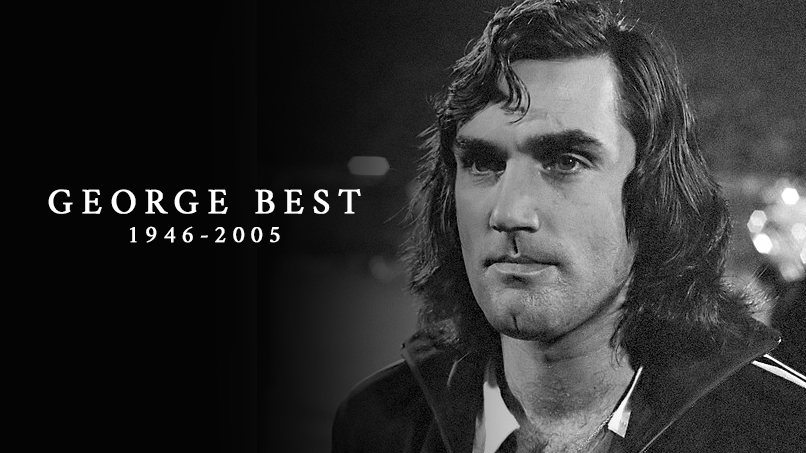In Memory Of George Best
LONDON, November 25, 2005 – Legendary Northern Irish footballer George Best passed away at the age of 59 at Cromwell Hospital in London after a long battle with illness. Hospitalized since early October, his condition worsened in recent weeks due to complications from an infection. His final moments were spent surrounded by loved ones, including his son Calum, father Dickie, former wife Alex, and many of his closest friends and former teammates.
Born on May 22, 1946, in Belfast, Northern Ireland, Best was widely regarded as one of the greatest footballers of all time. Spending 12 seasons with Manchester United, he won two English league titles and played a pivotal role in securing the club’s first European Cup in 1968. Known for his dazzling dribbles, exceptional skill, and immense popularity, Best became more than just a footballer—he was a cultural icon. In 1968, he was awarded the Ballon d’Or, and in 2004, he was named Britain’s Greatest Sportsman of All Time.
His international career with Northern Ireland included 37 caps and 9 goals, though he never had the opportunity to showcase his talent on the World Cup stage. Despite his on-field brilliance, Best’s life was marred by struggles with alcoholism, which ultimately led to severe health complications, including a liver transplant in 2002. His battle with addiction and its consequences culminated in his final public message, published days before his death: “Don’t die like me.”
A Footballing Icon – The “Fifth Beatle”
“I think I’ve found a genius.” That was the phrase talent scout Bob Bishop used when he discovered a 15-year-old George Best. Sent to Manchester United, Best flourished under the guidance of Sir Matt Busby, debuting in the 1963-64 season and immediately making an impact.
By the late 1960s, Best had become a global superstar, earning the nickname “The Fifth Beatle” due to his pop-star-like status. With a combination of skill, pace, strength, and flair, he captivated football fans worldwide. His defining moment came in the 1968 European Cup final when he led Manchester United to a historic 4-1 victory over Benfica, securing their first-ever European triumph.
Beyond the game, Best’s life was the embodiment of glamour and excess. From his stylish image to his celebrity relationships—including high-profile romances with beauty queens—he was the original footballer-playboy.
A Legacy of Triumphs and Struggles
Despite his immense talent, Best’s career began to unravel due to disciplinary issues, frequent absences from training, and his growing struggles with alcohol. After leaving Manchester United in 1973, he embarked on a journeyman career, playing for clubs in Scotland, the United States, and Australia, before retiring in 1984.
Best’s post-football life was marked by continued struggles with addiction, leading to arrests, controversies, and personal difficulties. In 1991, he famously appeared drunk on BBC’s “Wogan” show, further cementing his status as a tragic figure.
However, his genius on the pitch remained undeniable. Football legends like Pelé and Diego Maradona hailed him as one of the greatest players of all time, with Maradona calling Best his “ultimate idol.”
George Best’s Football Achievements
- Manchester United Career: 466 appearances, 178 goals
- Club Titles:
- European Cup (1968)
- English First Division (1965, 1967)
- Ballon d’Or Winner (1968)
- Northern Ireland National Team: 37 caps, 9 goals
The Final Goodbye
George Best passed away on November 25, 2005, after years of health struggles. His last message, published in the News of the World, was a powerful warning against alcoholism. A global outpouring of tributes followed his passing, with Manchester United fans, football legends, and world leaders honoring his memory.
Best’s legacy remains alive in football history, pop culture, and memorabilia. His influence on modern footballers and fans endures, and his memorabilia remains highly sought after by collectors worldwide.
George Best (1946 – 2005) – The Genius Who Lived Too Fast, Played Too Beautifully, and Left Too Soon.
